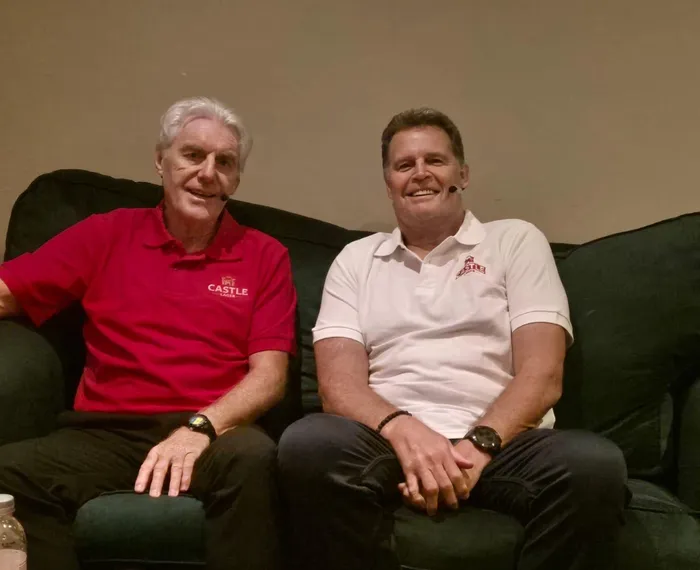
Broos to pick Rassie's brain Bafana Bafana head coach Hugo Broos with Springbok counterpart Rassie Erasmus. Photo: Rassie Erasmus/ X
Image: Rassie Erasmus on X
Hugo Broos has been hogging the headlines after restoring the country’s pride by leading Bafana Bafana to automatic qualification for the 2026 Fifa World Cup in the Americas.
Bafana’s qualification for the global event - which will be co-hosted by Canada, Mexico, and the United States - revived the long-standing mantra that "South Africa is a footballing nation.” Notably, it has been more than two decades since Bafana last qualified for the showpiece, having appeared merely as hosts in 2010.
During the country’s absence from the global football stage, it was the national rugby team, the Springboks, that hoisted the flag high. They are record four-time world champions, having won the last two editions in 2019 and 2023 respectively, to add to their 1995 and 2007 triumphs.
While many around the world could only envy them, Broos looked at the Springboks’ achievements and passion for their game as motivation.
After initially meeting current coach Rassie Erasmus and captain Siyamthanda Kolisi twice this year, Broos found it fitting to follow in their footsteps and return to the biggest sporting event of all: the World Cup.
Ironically, it was at the very stadium where the Springboks lifted their maiden World Cup crown in 1995 that Broos - after being photographed with Erasmus and Kolisi before the game - fell in love with the national rugby team.
“Springboks are a big inspiration for the players,” Broos admitted. “The way they sing the national anthem; you can see there’s so much passion in these guys.
“That passion was an example to us, to see the way they start their games. You can never say they didn’t give everything to achieve success, even when they lose.
“I was at the game when they lost to Australia at Ellis Park, but after the game, you couldn’t say they didn’t fight enough. It’s just that Australia were stronger than them.”
Broos is no stranger to the World Cup. He missed out on the 1980 European Championship and the 1982 World Cup with his native Belgium due to a nasty injury before finally playing at the 1986 edition in Mexico.
As such, the silver-haired Belgian is poised to join an elite group of footballers who have been to the FIFA World Cup both as players and as coaches. These include Mário Zagallo, Franz Beckenbauer, Alf Ramsey, Henri Michel, Diego Maradona, and Didier Deschamps.
Broos is thrilled that his career has come full circle, as that’s one of the greatest honours a person in football can ever receive.
“When you become a coach, you dream about that,” Broos said. “But there are not many coaches who can say they were at the World Cup as both a player and a coach. So, I was very motivated to achieve that, you can be sure.
“Certainly, it will be the end of my coaching career. So, I’m happy that I’ve achieved that, and that I can go to America, Canada, or Mexico. It will be a fantastic experience for me, also because it will be my first time there.”
Broos knows it wasn’t easy to turn things around at Bafana. When he first announced his intentions - which he followed to the letter - to transform the team from a “retirement village” of popular veterans into a rejuvenated squad of young players, he drew plenty of critics.
But voilà, he never backed down. He’s now reaping the rewards of his hard work and determination, as the core of his squad is made up of young, local-based players.
He believes the desire and determination of local players to qualify for the global showpiece will put them on the map and help them follow in the footsteps of some of Africa’s most successful footballing nations.
“For the players in this country, it’s very important that they can showcase their talent at that level,” Broos said. “Not many people know South African players that well.
“Senegalese, Ivorian, and Cameroonian players are widely known in Europe. When you talk about South African players in Belgium, they know Andile Jali, Darren Keet, and Percy Tau because they played there. The rest are not known.
“So, it’s important that they can show themselves at this level. I think that was a big motivation for all the players to be there.”
Broos admits he was critical of the lifestyle of South African-based players, as their off-the-field behaviour - which sometimes includes drinking alcohol - often interfered with their professionalism. That, he says, is totally unacceptable where he comes from.
“In Europe, it’s certainly not easy. There’s a certain attitude and discipline that you need,” Broos said. “I think South Africans can learn a lot about having a professional attitude as players.
“It’s not enough to go to training and then think your job is done. No, your job continues even after training. It’s a professional mindset. I know there’s a problem with some South African players, they like to drink beer. And that’s not professional. I’m very sorry!
“If you drink beer after you’ve qualified for the World Cup, fine. But during the week, no. You need the right attitude to perform.”
And while local-based players are used to nightlife, Broos was appalled to see that some of their best performers at club level were far from professional standards, something that reflected the declining quality of local football at the time.
“I was surprised when I came here to see overweight players,” Broos recalled. “How can you be an overweight professional? In Europe, if you’re overweight, you can’t perform. It’s impossible. But here, some of those players were considered among the best in their teams.”
Related Topics: